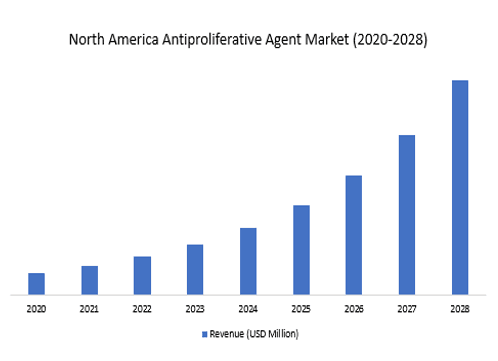The Increase in the Prevalence of Chronic Ailments requiring organ transplantation coupled with technological advancement is driving the market in North America region.
Author: Vikas Kumar
26 November 2023
Antiproliferative agents are the medication having the property to suppress cell growth, especially the growth of malignant cells in the surrounding tissue. Owing to this property they are widely used in the treatment of cancer. Additionally, they also possess immunosuppressive action that acts by inhibiting cell-cycle pathways, lowering T- and B-cell multiplication, and thereby lessening the cytotoxic response directed against the cardiac allograft. Owing to this, they are widely used in the treatment of autoimmune diseases and as immunosuppressant drugs post-surgery to prevent organ rejection by the body. The increase in the prevalence of organ transplantation is driving the market in this region. For instance, as per the IRODAT 2021 report, in 2021, the number of organ transplants from living donors in Mexico was 1,158. Hence due to the increase in organ transplantation in Mexico, there is a high chance of taking immunosuppressant medication after the liver transplantation surgery. Furthermore, the ongoing technological advancements in tissue engineering and organ transplantations, increasing healthcare spending, and the presence of well-established healthcare infrastructure are fueling the growth of the overall regional market to a large extent. Additionally, the data updated by the USFDA published in November 2021 showed that there were 4,944 FDA-registered facilities for biologics developments and 6,799 for human drugs.

For a detailed analysis of the Global Antiproliferative agents Market browse through– https://univdatos.com/report/antiproliferative-agents-market/
Based on indication, the market is segmented as autoimmune, cancer, organ transplant, non-inflammatory disease and others. Amongst these, the cancer segment would hold the dominating share during the forecasting period. For instance, according to the World Health Organization (W.H.O.) International Agency for Research Centre the prevalence of cancer cases would increase to 24.6M in 2030 from 19.3M in 2020. Additionally, as per the above-mentioned source, increasing obesity due to a sedentary lifestyle, consumption of processed food & sugary beverages, and increased alcohol consumption are the contributing factors to the rise in cancer prevalence globally.
Based on end-users, the market is segmented into hospitals, retail pharmacy and others. Amongst these, the hospital pharmacy segment holds the majority of the share during the forecasting period. This is due to patient preference for purchasing medicine from hospitals over outside retail pharmacy. Furthermore, hospital pharmacy source is reliable and safe for drug purchase, as it eliminates the purchase of misbranded drug purchased from non-reliable sources. Moreover, for inpatients, purchasing drugs from a hospital pharmacy is easily accessible over retail stores.
Access Sample PDF Here- https://univdatos.com/get-a-free-sample-form-php/?product_id=40858
Global Antiproliferative Agents Market Segmentation
Market Insight, by Drug Type
• Immunosuppressants
• Alkylating agents• Nitrosourea• Others
Market Insights, by Dosage Form
• Tablets
• Capsules• Injections• Others
Market Insights, by Route of administration
- Intravenous
- Orals
- Others
Market Insights, by Indication
- Autoimmune diseases
- Cancer
- Organ transplantation
- Non-inflammatory diseases
- Others
Market Insights, by End-Users
- Hospitals
- Retail Pharmacy
- Others
Market Insight, by Region
- North America
- U.S.
- Canada
- Rest of North America
- Europe
- Germany
- UK
- France
- Italy
- Spain
- Rest of Europe
- APAC
- China
- Japan
- India
- Rest of APAC
- Rest of the World
Top Company Profiles
- GlaxoSmithKline
- Johnson & Johnson Services, Inc.
- Cadila Pharmaceuticals.
- AstraZeneca LP
- Lupin.
- Cipla Inc.
Get a call back
